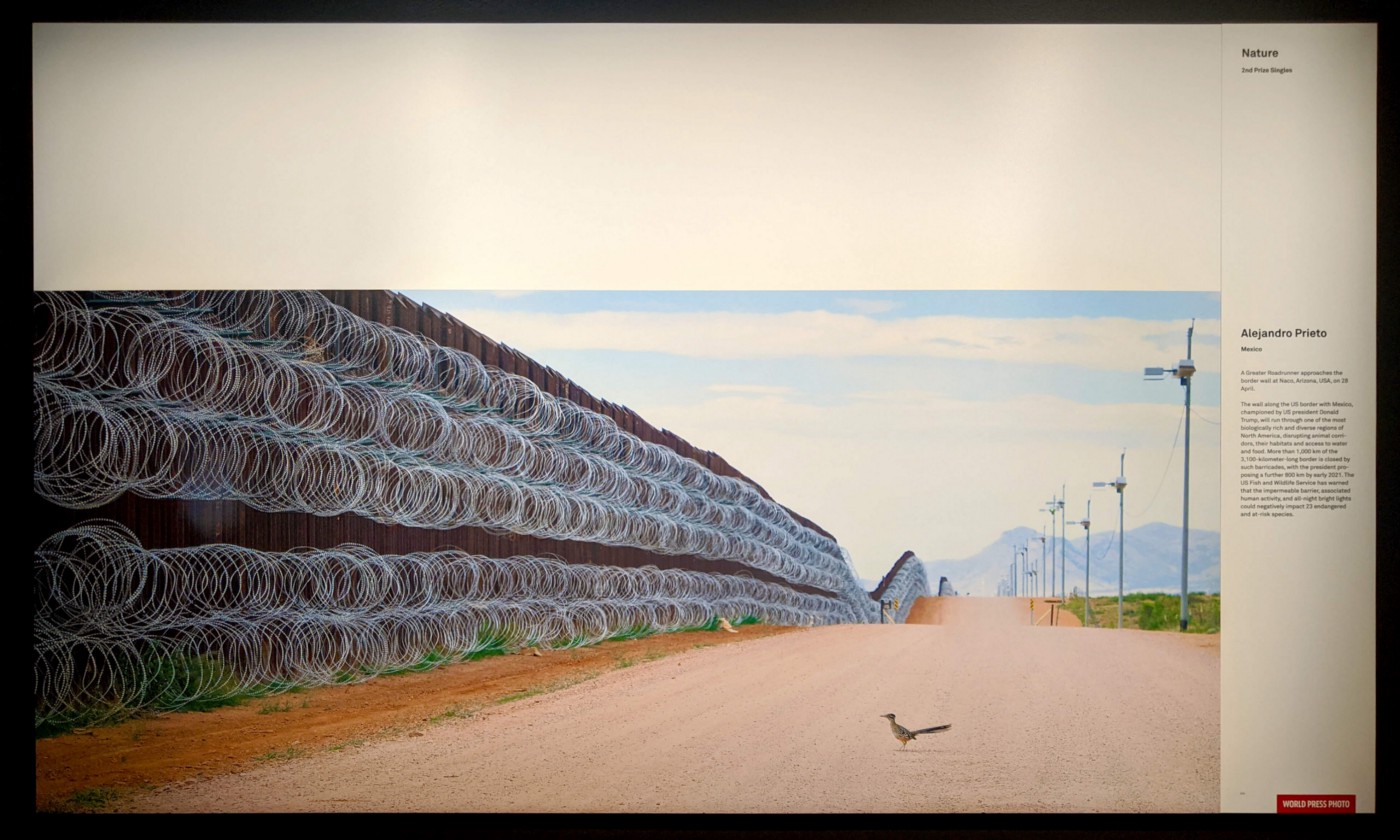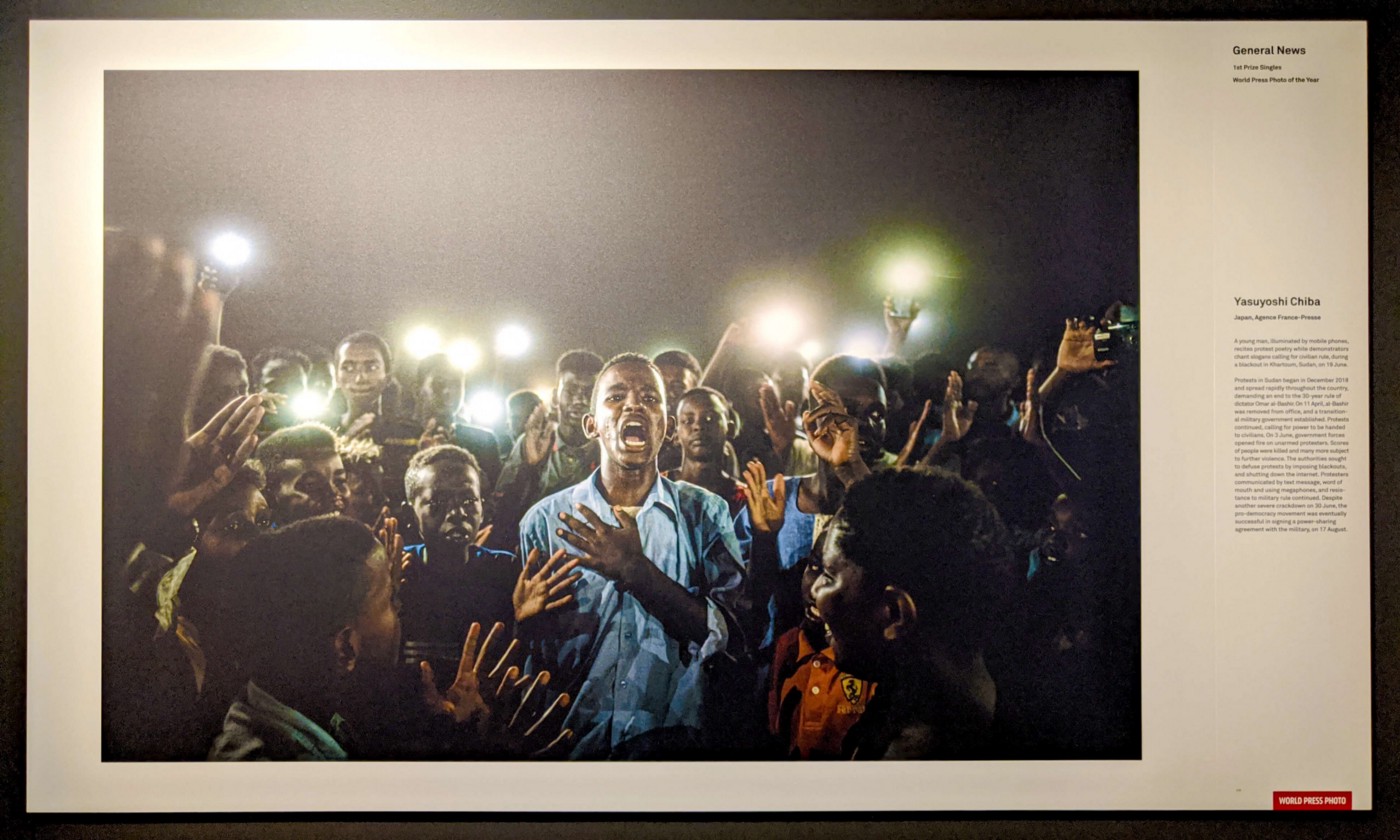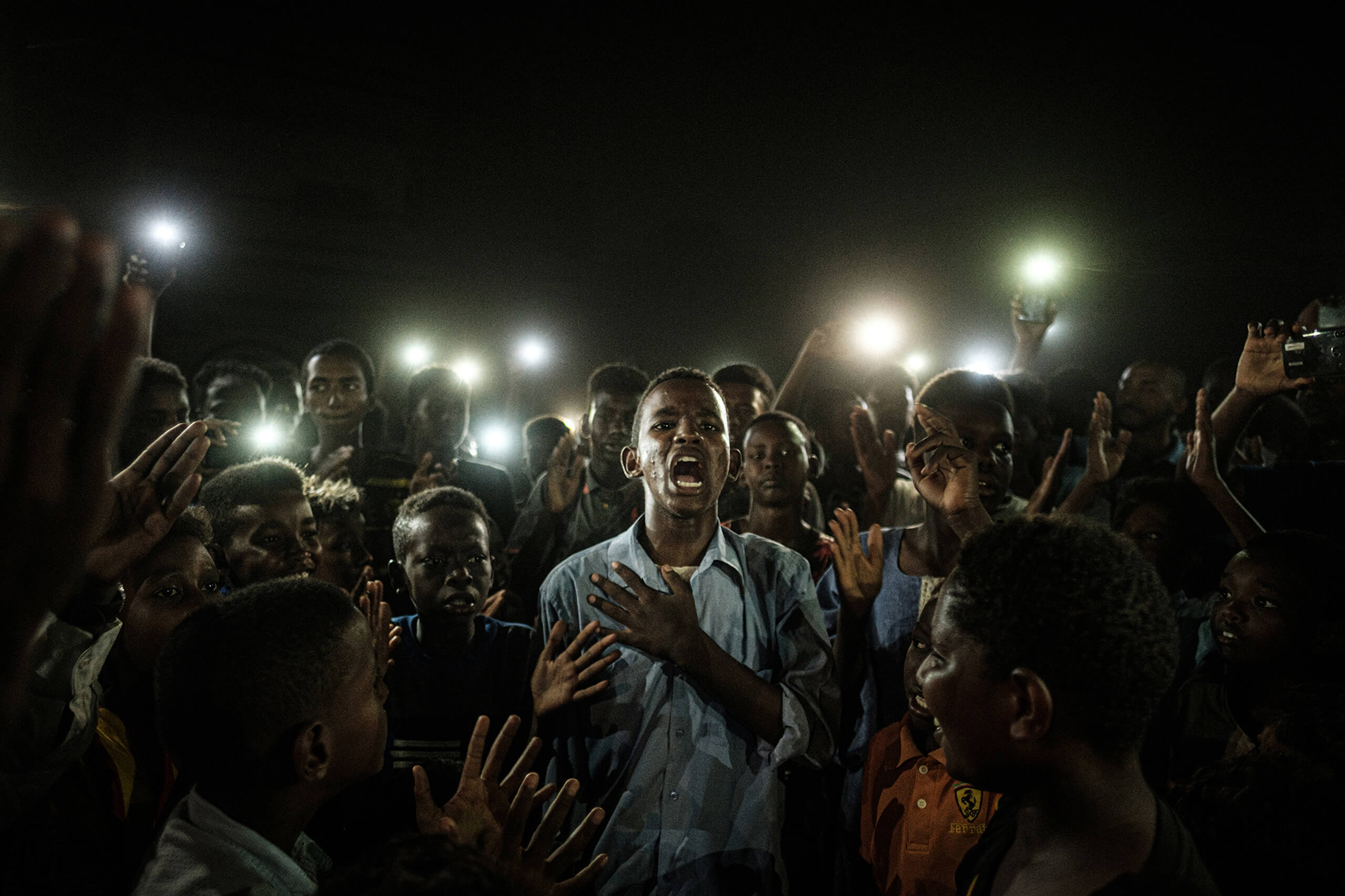We visited the World Press Photo Exhibition in 2020 and found it was a great way to step outside of our bubble. This eye-opening event highlights the news stories around the world that you might not necessarily know about.
War

This is a photo of an 18-year old boy laying on a hospital bed after he was badly burned in a conflict between Syria and Turkey in October 2019. His girlfriend was unable to enter the room at first as she was too horrified to confront his injuries, however, the nurses encouraged her to go in and hold his hand. This powerful photo summarises the hundreds of years of wars that have raged amongst humans since the beginning of intelligence-inception. The pain in this room is felt by both of them in different ways.
We have created artificial borders that are then used to justify killing each other because we don’t like one group controlling an area of land that is close to another. Humanity has brought this seemingly endless suffering on itself and we continue to do so, despite the ever-increasing exposure we have to information and news highlighting its devastating consequences. No amount of compassion for innocent victims and their loved ones has been able to put an end to this inexhaustible cycle of destruction we impose on our own human race.
Fleeing

The next group of photos tells the story of what has been happening in Venezuela over the past four years. Political corruption has caused the entire country to go into hyperinflation which essentially wiped any value from their currency. Imagine that you had £10,000 in your savings account and over the course of a year that money wasn’t even enough to buy a loaf of bread. Over 4.5 million Venezuelans left the country to find refuge in neighbouring Colombia. In this photo, people follow a path through swampland and the jungle region to enter Colombia illegally. Now, they are stuck in Colombia, with no access to healthcare, education or legal employment. Imagine fleeing the UK and being stuck in France where you aren’t allowed to earn money to feed yourself or your family. This story really highlights how fragile our system is and how greed, regulation and border control trumps compassion.
We have become complacent within our own bubble, permitting so many people to suffer as long as it doesn’t break the rules or affect us. I love this skit by College Humor, “I’m so Broke”:
Damaged minds

These groups of photos tell the story of the sons caught in the midst of chaos during the Iraq invasion of IS. Rezan, the 11-year-old boy on the left was kidnapped in 2014 and freed 5 years later. This photo for me symbolises the emotion and physical suffering of being taken away from your loved ones at an early age. The top right photo shows Khanke who was also kidnapped in 2014 — the photo really speaks volumes about the fractured minds of these children once they go through war. Their reality is seemingly half in the past and half in the present.
Corruption

I’d like to focus on the photo on the far left. We see an injured man being taken away in a taxi. For a couple of years now, Iraq has been at odds with political corruption. Protests directed at the government’s failure to deal with unemployment and provide public services came to a boiling point during these protests. The government forces acted with exceptional vigour firing live rounds on the protestors. In hindsight getting rid of a tyrant to bring democracy was like opening Pandora’s box — encouraging greed over billions of US dollars from oil money that were never spent into rebuilding Iraq but squandered into building lavish lifestyles for the few. What a familiar story we see here? Taking billions and using it for one’s own selfish needs? I’ve read about this oh so many times.
Human borders

I loved this photo — beautiful juxtaposition of nature vs man — this wall is between US and Mexico but because of it, many animals that use the region will be affected by it. This artificial wall between countries was drawn up in the 1800s.
How many people have been affected by borders? And what kind of message are we spreading by dividing things up instead of learning to cooperate. What purpose do they serve in a world where most other species are free to roam?
I loved watching the Borders series by Vox where Johnny Harris and Christina Thornell explore the stories behind the lines on a map.
Greed

This photo really brings the connection between human baby and animal baby. The innocence of the orangutang’s face is like the one you see when a baby smiles at you. I question, why is their life different to that of ours? Orangutans live on just two islands in the whole world — Sumatra and Borneo and yet we have chosen to take their homes, Palm trees, to extract palm oil so we can enjoy it in our food. This photo really highlights the level of ignorance we have employed upon ourselves. At these moments in life, I try to analyse how the human mind embodies these candid emotions of food that allow themselves to carry on with things that carry so little significance for ourselves but so much for others.
Ignorance

Here we see a fisherman hiding his boat illegally on Lake Victoria as he prepares to work. This photo expresses a mixture of different messages — we are transfixed by what the man is doing and why he is prepared to work illegally? Does he have a family? Maybe there isn’t work outside fishing illegally? Or are the corrupt governments and companies just taking as much as they can while causing serious issues such as pollution, harvesting of resources and land clearance around the banks.
So why is it illegal for him to fish? He is essentially taking immature fish (fish before they can breed) because he can’t afford nets or larger boats that can take him beyond the worst pollution around the banks near the shorelines — the same pollution caused by the very same governments and companies. It slowly starts to paint a picture of how greed is involved in all of this. All we want is to become rich and so taking away from poor people trying to feed themselves starts to become okay, as it allows us to have the finer things in life. All this “want to be rich” obsession that we are being sold is nothing more than the justification of corporate greed. They want us to be okay with what they’re doing, so we can have this picture of happiness but only if we follow corporate greed. As children, we are sold this image of what life needs to be for us to attain happiness through movies, TV shows, newspapers, teachers and companies but it’s merely one version that might not necessarily fit everyone.
Dealing with trauma

We are looking at bipolar images. The one of an Armenian girl who has given up on life as she goes into a semi-coma state through psychological trauma called Resignation Syndrome (RS) because of a long asylum process. While the second image is a powerful one of never giving up. Musa Motha was a rising football player when at the age of 11, he had his leg amputated as a result of cancer. He now uses his crutches to perform beautiful dance moves and performs with the Vuyani Dance Theatre in South Africa.
Poetry not war

I saved this last photo to the end, as it has such a powerful story behind it. Protests began in Sudan back in 2018 when people were demanding an end to the 30 years dictatorship of Omar al-Bashir. The government tried to control the situation by using blackouts and shutting down the internet but the people endured and communicated through text messages, word of mouth and megaphones. We can see the boy is gripped by his words and he puts his hand on his heart as he is reciting protest poetry during a blackout night in June. He is using his words to express emotion and connect a nation of people together.
Final thoughts
We should never forget the power of words — we should never forget the responsibility we have to make sure we use them wisely. We should also never forget to keep our eyes and ears open to different ways of thinking or thoughts, because they may be the ones that change the world for the better. Be compassionate to difference and learn to cater to expression.
- Top photo © Yasuyoshi Chiba, Japan, Agence France-Presse
- World Press Photo
- World Press Photo Exhibition 2020 at the State Library of NSW

No Comments.